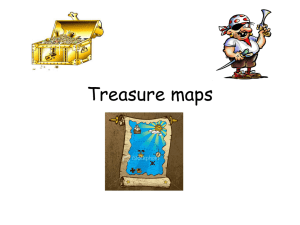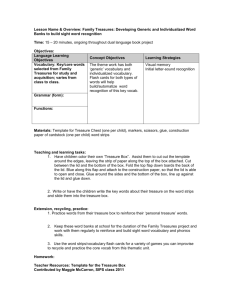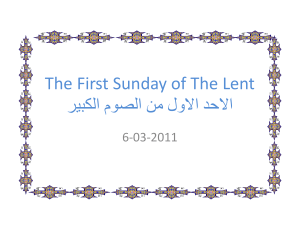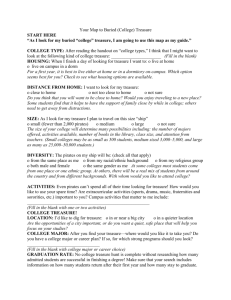The Lesson of Atlakvida`s Three Funerals
advertisement
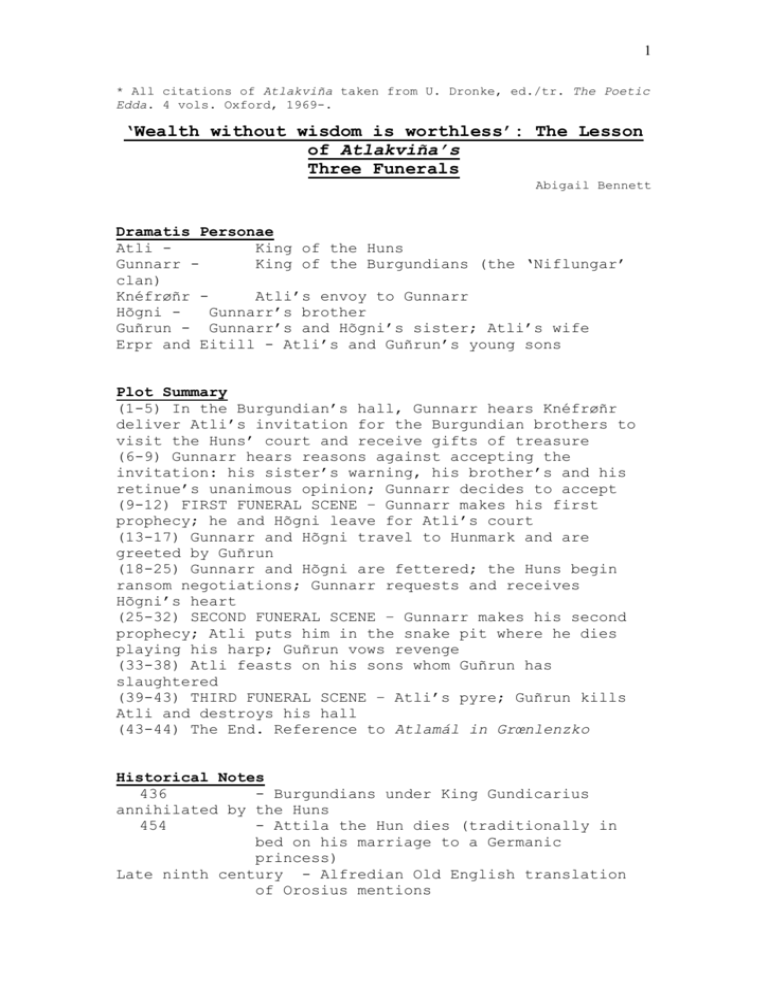
1 * All citations of Atlakviña taken from U. Dronke, ed./tr. The Poetic Edda. 4 vols. Oxford, 1969-. ‘Wealth without wisdom is worthless’: The Lesson of Atlakviña’s Three Funerals Abigail Bennett Dramatis Personae Atli King of the Huns Gunnarr King of the Burgundians (the ‘Niflungar’ clan) Knéfrøñr Atli’s envoy to Gunnarr Hõgni Gunnarr’s brother Guñrun - Gunnarr’s and Hõgni’s sister; Atli’s wife Erpr and Eitill - Atli’s and Guñrun’s young sons Plot Summary (1-5) In the Burgundian’s hall, Gunnarr hears Knéfrøñr deliver Atli’s invitation for the Burgundian brothers to visit the Huns’ court and receive gifts of treasure (6-9) Gunnarr hears reasons against accepting the invitation: his sister’s warning, his brother’s and his retinue’s unanimous opinion; Gunnarr decides to accept (9-12) FIRST FUNERAL SCENE – Gunnarr makes his first prophecy; he and Hõgni leave for Atli’s court (13-17) Gunnarr and Hõgni travel to Hunmark and are greeted by Guñrun (18-25) Gunnarr and Hõgni are fettered; the Huns begin ransom negotiations; Gunnarr requests and receives Hõgni’s heart (25-32) SECOND FUNERAL SCENE – Gunnarr makes his second prophecy; Atli puts him in the snake pit where he dies playing his harp; Guñrun vows revenge (33-38) Atli feasts on his sons whom Guñrun has slaughtered (39-43) THIRD FUNERAL SCENE – Atli’s pyre; Guñrun kills Atli and destroys his hall (43-44) The End. Reference to Atlamál in Grœnlenzko Historical Notes 436 - Burgundians under King Gundicarius annihilated by the Huns 454 - Attila the Hun dies (traditionally in bed on his marriage to a Germanic princess) Late ninth century - Alfredian Old English translation of Orosius mentions 2 Burgundian settlement in Norway, ‘Burgenda land’ Early tenth century - Composition of Atlakviña Gunnarr’s Prophecies First Funeral Scene, First Prophecy (stanza 11) ‘Úlfr mun ráña [The wolf shall rule arfi Niflunga, the inheritance of the gamlar gránferñir, Niflungar, ef Gunnars missir, the old packs of grey birnir blakfialler ones, bíta ãreftõnnom, if Gunnarr is lost. gamna greystóñi, The swart-skinned bears ef Gunnarr né shall bite with kømrat.’ wrangling teeth, bring sport to the stud of curs, if Gunnarr does not come back.] Second Funeral Scene, Second Prophecy (stanzas 26-27) ‘Svá skaltu, Atli, [You shall be as far, augom fiarri, Atli, sem munt meniom from the eyes of men, [mínom] verña: as you shall be er und einom mér from the treasure that õll um fólgin is mine. hodd Niflunga – On me alone lifira nú Hõgni. all the secret rests of the Niflung hoard – Ey var mér tÿia, now Hõgni is not meñan vit tveir lifñom, living. nú er mér engi, er eke inn lifik. A doubt was always with Rín skall ráña me rógmálmi skatna, while both of us lived, [á] sú in áskunna, now there is none arfi Niflunga. when only I am left Í veltanda vatni alive. lÿsaz valbaugar, The Rhine shall be heldr en á hõndom master 3 gull skíni Húna bõrnom.’ of the metal of men’s strife, the god-sprung river rule the inheritance of the Niflungar. In rolling waters rather shall the foreign rings glint than that gold should shine on the Huns’ children’s hands!] Atlakviña, among the earliest heroic poems of the Poetic Edda and usually attributed to ninth- or tenthcentury Iceland or Norway, contains a complex narrative which frequently leaves modern readers bewildered as to the motives behind its characters’ actions. Perhaps the aesthetic shock of the poem’s continual, monstrous and exotic violence appreciation of prevents its us finesse. from With developing Hogni’s any laughter ringing in our ears as his heart is graphically removed at his brother’s request, we perhaps may be pardoned for 4 not feeling a keen urge to know any further particulars. A further obstacle to the modern reader is the poem’s pregnant language and compact, fast-paced narration. Anthony Gilbert summarizes nicely that “there is a degree of compression and density of meaning that demands greater knowledge and sophistication on the part of the audience”. interpretation Atlakviña to is correct, those who He goes on however, if my to confine already have appreciation some studying early medieval Germanic culture. of experience He writes, “the principles on which [the characters act] have to be inferred from a general knowledge of Germanic values”. In a sense this paper will attempt the reverse: it will arrive at some ideas about these socalled Germanic values through a predominantly literary examination of the poem itself. Our point Atlakviña will of entry be into treasure, the a concept importance to the poem’s basic plot. of the semiotic poem itself, potency, and treasure various strange of world of central Like the language contains a wide-ranging understandings of its significance underlie much of the crucial decision-making that takes place within the narrative. Though hoards of the sort referred to in Atlakviña have gone rather out of fashion, the modern reader should have little difficulty accepting the close connection between wealth and power or authority. Early medieval treasure hoards should be 5 understood as both representations power already possessed and the potential to exercise further power. However we should be sensitive to the simultaneous, less economic, more ethical value such treasure possesses as heirloom – as is the case of Gunnarr’s fabled ancestral Niflung hoard. Wolfgang Mohr provides a particularly neat summary of the Niflung treasure hoard’s multivalent role in the realpolitik of Atlakviña. It is worth quoting at length: “The treasure of the Nibelungs is the symbol of Burgundian power. No, it is more than a symbol, it is a political reality. Wars were fought in the period of the folk-migrations about stores of treasure, and Atli’s desire for it has a political aim. Whoever has the treasure has the quite unsymbolic power of being able to equip an army and to attract followers.” Atlakviña explores in particular the disparity between treasure’s ‘symbolic power’ army’ it can produce. and the ‘quite unsymbolic The poem presents the distance between the two as either insurmountable or insignificant depending upon the wisdom of the treasure’s owner. A maxim of Alfred the Great neatly summarizes this central lesson of worthless’. Atlakviña: ‘wealth The poem’s three without funerals are wisdom is especially interesting nexuses of wealth, wisdom, and what they are worth. The First Funeral: Gunnarr and Hõgni cross Mirkwood 6 In response to Atli’s invitation and offer of treasure, Gunnarr decides to visit the Hun court after reviewing should overwhelming not accept intelligence Atli’s that invitation. tells This him he decision, which Brian Murdoch labels the real enigma of the work, is usually categorized as a noble and heroic act. Two examples of this view are H.M. Bowra, who writes that Gunnarr “feels his honour is somehow at stake and that he must go”, and Anthony Gilbert’s explanation that Gunnarr is seeking family.” “an honourable This disconcertingly ‘noble grounded death and in for himself heroic’ ideas and approach which may his seems have no meaning for Atlakviña’s historical context. How can we be sure, or even think it possible, that our own, Bowra’s, or Gilbert’s coincide definition with the those of ‘honour’ of and Atlakviña’s ‘honourable’ audience or authors some thousand years back? Brian Murdoch proposes the more pragmatic explanation that by accepting Atli’s invitation, Gunnarr “blocks all possibilities of the acquisition by the Huns of this treasure, which is a defeat for Atli”. One foible in this approach is its implication that Gunnarr understands treasure the same way that Atli does, an implication incongruous with the poem’s presentation of its two kings as possessed of very different degrees of 7 wisdom regarding their wealth. How does the text itself lead us to understand Gunnarr’s decision? Gunnarr eventually explains his enigmatic decision himself. His reasoning includes both a ‘heroic’ concern for personal honour and a more pragmatic concern with the treasure, not because Gunnarr considers either to be an end in itself, but because both are useful to his ultimate objective: to close that distance, as delineated above, between ‘symbolic army’. Gunnarr predicts, or rather prophecies: ‘Úlfr mun ráña arfi Niflunga, gamlar gránferñir, ef Gunnars missir, birnir blakfialler bíta ãreftõnnom, gamna greystóñi, ef Gunnarr kømrat.’ (11) power’ and ‘quite unsymbolic [The wolf shall rule the inheritance of the Niflungar, the old packs of grey ones, if Gunnarr is lost. The swart-skinned bears né shall bite with wrangling teeth, bring sport to the stud of curs, if Gunnarr does not come back.] This explanation, needs an explanation. Considering the poetic context in which this verse appears helps get us started. The way in which this stanza’s unbound energy contrasts with the tense and foreboding atmosphere which oppresses the preceding stanzas suggests that Gunnarr’s prophecy describes how his protection of the Niflung hoard will equip his followers with courage and vigour – a courage and vigour they saliently dangerously – lack in poem’s opening scene. – and 8 When Knéfrøñr arrives at Gunnarr’s hall, he finds the Burgundians in a state of ill-concealed vulnerability: “There the war-band drank – thoughts were hooded in silence – wine in the exotic hall – they feared the Hun’s anger”. brow-beats them They sit passively by as the Knéfrøñr and patronizingly deceitful and fatal summons. ‘kaldri rõddo’, duplicitous a and phrase perhaps deals their king a He delivers his message in usually mocking denoting tone. a hostile, Further, the strikingly similar, metrically parallel phrases ‘hiálmom aringreypom’ (hearth-encircling aringreypom’ helmets) (hearth-encircling and ‘bekkiom benches) further emphasize the discrepancy between the Hunnish force and the Burgundians. The Huns deck their hall with war-gear, the Burgundians with domestic accoutrements. The situation is clear: protectors of his state, openly, in aggressive heroic their own foreign formulae fear hall, environment is peopled poet expressly for by a They their The ostentatiously violating them. warriors, the Huns. before envoy. here Gunnarr’s king seems the to the do so and an employ purpose of A conventional mead-hall non-heroic war-band, and retainers surrounding their lord in the presence of a possible enemy show no willingness to act in his service. This purposeful mise-en-scène outlines element of Atlakviña’s basic plot. a foundational The deficiency of the 9 Burgundian war-band vis-a-vis their Hun neighbors remains Gunnarr’s most pressing concern throughout the poem. When Gunnarr announces his decision to accept Atli’s invitation, his words stir the morose hall to life and disperse the dark tension. Thoughts hooded in silence are replaced by his confident words: “Gunnarr called to them as a king should, glorious in his meadhall, in great passion of spirit, ‘Rise now, Fiõrnir, make the warriors’ gold cups flow round the hall in the hands of men’”. Gunnarr’s prophecy speech replaces the ominous stagnation of the preceding stanzas with flashing images of bellicose activity. Reviewing the first half of the prophecy, “the wolf shall rule the inheritance of the Niflungar, old packs of grey ones, if Gunnarr is lost”, we could interpret that this describes the Niflung treasure ruled by the warriors of the past, ‘old packs of grey ones’, and Gunnar counts himself among them. If we look to Snorri’s very helpful Skáldskaparmál, we ‘ancient, olden of find that gammall times’. (old), Grár can (grey), mean is metaphorically ‘grim’ and ‘dangerous’, and ferñ (pack of wolves) can mean a ‘troop’ or ‘war-band’. When he says ‘gamlar gránferñir’ (old packs of grey ones), Gunnarr is probably referring to the old Niflung heroes, ‘grim warbands of ancient times,’ whose ranks he plans to join. The second half of the prophecy stanza describes how 10 Gunnarr’s use of the treasure (in this case, his hoarding of the treasure) will benefit the surviving Burgundians by turning ‘symbolic power’ into ‘a quite unsymbolic army’. The last half of the stanza reads: ‘‘The swart- skinned bears shall bite with wrangling sport to the stud of curs, if back”. His capability frightened and fight bring Gunnarr does not come warriors like teeth, will bears regain and their wolves, the conventional beasts of heroic battle. Atlakviña’s first funeral scene has Gunnarr’s wise evaluation of treasure’s worth. revealed He has successfully used it as political power by equipping his army with the conviction and courage they need if they are to be effective. During what can reasonably be called his funeral, Gunnarr distributes his treasure to his successors in the form of military strength. He bequeaths a fruitful legacy drawn from the Niflung hoard of his fathers, itself. At though their it departure is not for the material Hunmark, Gunnarr gold and Hõgni leave heirs and ‘lÿñar óneisir’ (valiant people) who will inhabit their now well-protected ancestral hall. We turn now to the second funeral scene, in which Gunnarr is put in Atli’s snake pit. Atli is to be seen as the ruler of a formidable following, a force imposing enough to nearly destroy 11 Burgundian morale. In Atlakviña, however, the superior resources of the Huns are undermined by Atli’s lack of wisdom and serve to magnify his deficiency as a ruler. We see that he only understands how to have wealth; he is incapable of using it. As he escorts Gunnarr to the snake pit, “Atli the mighty rode a steed with ringing mane, encircled by blades of war.” Here is a mute “Atli the mighty” buoyed up by all his trappings of potency and yet unable to accomplish his purpose (the acquisition of the fabled Niflung hoard). with the adjacent This image contrasts sharply image of ‘einn Gunnarr’ (Gunnarr, alone) in fetters and strumming his harp triumphantly at the bottom of the snake pit. Let us venture a working definition of authority or power as distance. already the to enforce ones will from Gunnarr uses his treasure in this way. crossed literature ability for Mirkwood crossing (a common spiritual metaphor boundaries a Having in Norse such as between life and death), he arrives at his second funeral in temporal and spatial isolation from his resources. As he tells Guthrun, “it has grown late now, sister, to summon the Niflungar – it is a long way to seek for an escort of men from the hills of Worms on the Rhine, for valiant fighters”. Yet as he has prophesied, these resources of kinsmen and warriors continue to function as extensions of his will. Gunnarr’s superiority of strength lies not in a superior endowment of wealth but in a 12 wisdom that enables him to manage what resources he does have and utilize them as power. Gunnarr’s final prophecy, that the Niflung hoard will be forever hidden in the Rhine and that “you shall be as far, Atli, from the eyes of men as you shall be from the treasure that is mine” foretells Atli’s demise. This seems much more clearly-stated than Gunnarr’s first prophecy, but it also has its subtleties. obviously physically treasure. Gunnarr dead wishes and here to physically For example, describe lacking Atli the as Niflung However, we should recall that Gunnarr will be in exactly this position himself, and has seen how his will shall survive him. Dead and without wealth does not necessarily equate to impotent, and therefore does not effectively describe a defeated ring-giver. Instead of, or rather, in addition to telling Atli that he will die without the Niflung hoard, Gunnarr predicts that when Atli follows him across Mirkwood into death, far from the eyes of men and treasures like the steed with ringing mane or the blades of war with which he had so closely encircled himself, then Atli the mighty utterly insignificant and cease to exist. will become Atli’s wealth is worthless. Now we move to the third and final funeral scene at which we find Atli’s pyre. 13 Gunnarr’s political prophetic success. funerals Atli’s have funeral displayed shows a his massive political failure. As Brian Murdoch summarizes, “he loses his life, his posterity, and his state”. Atli is not villainized in Atlakviña because he abuses the laws of hospitality, out people’s hearts, or is generally the sort of man who keeps a snake-pit. breaks a solemn oath, cuts Rather, Atli is held up for derision as a ring-giver whose wealth is worthless: essentially, as a man who lacks wisdom. Timothy Reuter explains that for rulers of early medieval Europe, “treasures are there to be amassed for conspicuous display, and at appropriate moments for conspicuous dispersal. Death, however, is not an appropriate moment, because the dispersal of treasure is part of what it means to be politically alive.” This sheds some light on Atli’s error and the real ignominy of his death: not that he is killed by a woman (though this certainly doesn’t help matters), but that he fails to use his treasures and renders them fruitless to his heirs. As will be seen below, the value of treasure to Atli will always be theoretical and dead. His inability to use his treasure is evident in his first action, invitation to Simplistically, when his Gunnarr Atli appealing to himself. offer works tempts of to treasure his Gunnarr in the disadvantage. with what is Urusla Dronke notes that Atli’s 14 lavish offer of treasure is obviously inappropriate: “why does Atli offer wealth to the wealthiest world, owners of the Niflung hoard?” men in the This offer betrays to Gunnarr that Ati’s vision of treasure is trapped in the realm of the symbolic: when one has treasure, what could one possibly want but more treasure? Atli tries to convert his wealth from symbolic power (his treasure) to more symbolic power (the Niflung hoard) rather than as Gunnarr wisely does, from symbolic power (the Niflung hoard) to real power (his army). His judgment is limited to discerning differences in quantity and he is blind to differences in quality. He can fathom his potential power’s ability to buy a higher quantity of that same kind of power, but not its ability to buy a higher quality of power. This understanding (or lack of it) informs Atli’s ransom offer to Gunnarr, when he asks “if he would, for his life, lord of the Goths, pay with gold”. (length Atli judges life’s value in terms of its quantity of days as the opposite of death), not its quality (living ‘sem konungr skuldi’ (as a king should) as opposed hand, has to ineffectively). the sagacity Gunnarr, and on the far-sightedness other to discriminate between quality and quantity when using his resources. He uses his potential power to buy a higher quality of power, a real power that has immediate and 15 favorable effect on his followers, and immediate and devastating effect on his enemy. The devastation of course involves Guñrun. Does Gunnarr know that she will attack Atli? First, let us propose his that Burgundian. he would have does warn her brothers follows then that Gunnarr She treachery. It considered sister of a Atli’s would have counted her among the swart-skinned bears of his first prophecy, who shall bite with wrangling teeth, if Gunnarr does not come back. When Atli comes back from the snake- pit but Gunnarr does not, Guñrun certainly bites. Gunnarr’s prophetic assessments, both of what will happen if Gunnarr a does dead not Atli, come now back, prove to and be of the puissance of extremely accurate. Atli is forced to distribute his wealth at the inappropriate moment of death because he has failed to perceive how his opponent’s symbolic power has become active power and changed the political environment into an extremely hostile and volatile one. that Gunnarr’s defiance would Never considering bring the trembling Burgundians to life, Atli returns from a pleasant day at the snake-pit and walks unsuspecting into the teeth of Guñrun’s ghoulish vengeance. Of early medieval funeral bequeathals, Timothy Reuter writes that “one should have enough time before one’s death to set one’s house in order and make a good end”; but Atli’s house collapses 16 around him with his wealth still uselessly inside. He is burned among layers of treasures still trapped in their symbolic forms. Physically at the center of Atli’s pyre are his murdered sons, Erpr and Eitill, whom he and his company have been eating. his followers. Next come his own body and those of Over treasure (40). all this Guñrun scatters Atli’s The layering of Atli’s wealth – from the future life of his clan, to the present life of himself and his warriors, to the finery that glitters about them – accurately reflects how treasure operates in the world of Atlakviña. Treasure is only the surface of power; the active, most significant elements of its value reside in the human resources treasure can be used to manipulate, and in the posterity this manipulation nurtures. This last funeral scene shows what treasure has been worth for Atli. Both he and Gunnarr have coveted the Niflung treasure; or rather, Gunnarr has coveted arfr Niflungar (the Niflung inheritance) while Atli has wanted hodd Niflungar (the Niflung hoard). Gunnarr’s funerals demonstrate his his ability to empower following and provide for the future generations of his father’s hall. Atli, failing to value treasure’s human dimension, has wealth to bequeath but no heirs to leave it to. Erpr and Eitill are described as young, untried by life. Atli’s wealth they never realize their Like potential as 17 active powers of the Hun kingdom. In the end, ancient rafters, temples, young maidens, the monuments of Atli’s ancestral clan – all cognates of arfr and symbols of continuity – are engulfed in the conflagration of Atli’s blundering avarice for hodd. “The ancient rafters fell, smoke rose from the temples, the homestead of Buthli’s clan, and the shieldmaids were burnt in the hall, their flow of life staunched – they sank into the hot flames.” Gunnarr has become part of his arfr, one of the legendary Niflung warriors who inspire the Burgundians to military action. Atli has become part of his hodd, symbolic and powerless, sterile and dead. In conclusion We can say that with acquiring acquiring however, Atlakviña’s ring-givers are concerned wealth because power. The poem between having they are concerned with draws treasure a and clear distinction using treasure. Gunnarr’s wealth is power while Atli’s wealth is just wealth, just a symbol of power. powerful rulers are Treasure hoards and characteristic of the heroic landscape; but the conversion of treasure into power, a process that tests human strengths and weaknesses, is characteristic of the heroic mindset. Klaus von See argues that the narrator’s approval when Gunnarr guards his gold, ‘svá skal gulli / frœkn 18 hringdrifi’ (so must a brave, munificent lord guard his gold), can only be rationally applied to “how a king in the Norse Heroic Age, in the Viking Age, should act”. He points out that the comment is only meaningful to ‘the spirit of that age’, and hence that the truth of the statement is to be found in the illustration of that age which it affords us. Atlakviña’s lesson that ‘wealth without wisdom is worthless’ should be a salient feature of any portrait of the spirit of this ‘heroic age’. Perhaps it forms part of what Anthony Gilbert meant by ‘a general knowledge of Germanic values’.


